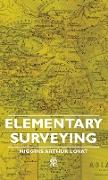- Start
- Elementary Surveying
Elementary Surveying
Angebote / Angebote:
ELEMENTARY SURVEYING by ARTHUR LOVAT HIGGINS. PREFACE: Now that Elementary Surveying is regarded as something more than a mere adjunct to mathematics and geography, it appeared to the writer that there might be a place for a little book which aims at opening a vista of the educational and professional possibilities of the subject, presenting it as the application of a few general geometrical principles rather than something akin to a handicraft with each operation an entity. It is hoped this book will stimulate enthusiasm among those who contemplate entering one of the professions implied in the Introduction or, otherwise, create an interest in the other mans job. The text is based largely upon the syllabus in Elementary Surveying in the General School Examination of the University of London, and matter outside this curriculum is indicated with an asterisk, suggesting the introduction to an intermediate course in the subject. Also many of the questions are taken from papers set by the writer in this particular examination and he takes this opportunity of expressing his indebtedness to the Senate of that University for their courtesy in permitting him to reproduce this material. In addition to the theoretical exercises, a number of field exercises are added, and these no doubt will suggest lines upon which others can be devised in keeping with what may be conveniently styled local conditions. These examples are short, and anticipate the adoption of parues of three four at most pupils, this organisation, in the writers opinion, being the only rational way of handling the subject. Parts of larger surveys or schemes can be allocated to these parties, who retain their identity as far as is practicable. Prior to going into the field the routine should be outlined so as to reduce supervision to a minimum, and, better still, to leave the parties to their own devices. The writer takes this opportunity of expressing his indebtedness to Mr. A. N. Utting, of the Cambridge University Engineering Laboratory, for preparing the drawings from which the figures are reproduced, also his thanks to Mr. S. G. Soal, M. A., of Queen Mary College, for his kindness in reading the proofs. In conclusion the writer acknowledges the agency of his wife, whose influence really led him to undertake this short but pleasant enterprise. Queen Mary College, ARTHUR LOVAT HIGGINS cjo Kings College, Cambridge CONTENTS CHAPTER PAGE INTRODUCTION 1 I. FUNDAMENTAL PRINCIPLES 4 Co-ordinates Five fundamental methods Triangulation and traversing Offsets, locating objects Chains and chaining Sloping distances Other modes of linear measurement Signals II. CHAIN SURVEYING 22 Equipment Field book Outline of simple survey Boundary lines Traversing with the chain III, PLOTTING PLANS AND MAPS 30 Construction and use of scales Special scales Plotting and finishing maps Conventional signs Constructing angles use of protractor and trigonometrical tables Enlarging maps and plans IV...
Folgt in ca. 15 Arbeitstagen
